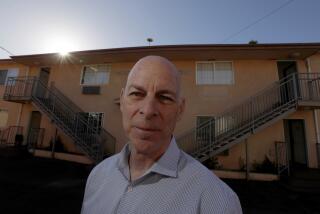A Force for Recovery : Through Project Headway, Anne McLean Gives Brain-Injured Patients Care--and Hope
- Share via
Anne McLean is exhausted, emotionally and physically. She has just returned to her Fairfax District home after spending hours at a Northridge hospital with her son, Martin. He can’t speak to tell her the source of his pain, resulting from surgery after a fall in the long-term-care home where he lives.
Martin is back at his home now. Her son’s recent injury was only the latest crisis McLean has faced since the day in January, 1980, when she received the shattering news: Martin, then 30 and a dental business consultant, had been hit head-on by a drunk truck driver on Malibu Canyon Road.
“I never thought I’d see what I see,” McLean says wearily, in the brogue of her native County Mayo, Ireland. “You hear people have an accident, and they go to a hospital or die, and you never hear anything more.”
For Martin McLean and his family, the aftermath of the accident is lifelong, but during this time his mother has not only coped with their own tragedy, but reached out to others.
When she got the news of the accident, McLean was a widow living in Melbourne, Australia. She moved with her six other sons to Los Angeles to care for Martin, who underwent several brain surgeries and then had a seizure that rendered him unable to recognize her or to perform simple everyday functions.
In the early years, McLean looked after her son at home. In 1984, she and other parents in a support group, frustrated by the lack of adequate long-term care available to their brain-injured loved ones, opened a home in Sylmar. Thus was born Project Headway, thought to be the only organization in California providing specialized care in a residential setting for brain-injured adults who otherwise could not afford it.
Today, the program operates four group homes in Northridge and Reseda for 23 men and women, ages 18 to 54. Other founders burned out, but McLean, who turns 70 this month, has remained a driving force.
Drawing on experience gained when she owned a nursing home in Melbourne, she visits each home every weekday, accompanies patients to doctor and dental appointments, counsels parents and performs duties left undone by an administrator who can be paid for only 10 hours a week.
Of the inspiration behind Project Headway, McLean says, “There was nothing out there. People with brain injuries are not wanted in nursing homes, because they’re too difficult, and they don’t have the money.”
In addition to McLean’s son, current residents of Project Headway homes include a former fire captain who had an off-duty motorcycle accident, a woman who suffered a brain aneurysm, and another young woman brain-damaged by oxygen deprivation during an asthma attack.
Residents receive physical and speech therapy and neuropsychological services, attend movies, go horseback riding and gather for dinners and evenings of music, games and recreational therapy.
“The main thing is, we try to make a home as near as possible to the homes they had,” McLean says. “These are people who would be forgotten by society. And often, they’re young, because young people have more accidents and gunshot wounds.”
One motorcycle accident victim had spent nine years in a hospital bed in his parents’ living room, but now he gets around in a wheelchair. Another success story is Lara Ames Hughes, 27, who shot herself in the head in a suicide attempt two weeks after her 18th birthday.
“She had five brain operations,” says her mother, Pat Ames-Urie of Sherman Oaks, a former systems engineer for Lockheed. “They said she would never walk, talk or come out of her coma, and she did all that.”
Another vote of confidence comes from Dr. David Brandes, a Northridge neurologist who has treated Martin McLean for a decade and joined Project Headway’s board of directors a year ago.
“One of the most important features of Project Headway is that it allows for the socialization of brain-injured people,” he says. “Most are conversant and have the capability of enjoying life, and we shouldn’t deny them that.”
Project Headway, like other facilities, has a waiting list. McLean would like to open a fifth home, but money is tight; insurance on a donated van and school bus runs $10,000 annually, and last year’s Northridge earthquake caused considerable damage.
“We’ve had garage sales, theater nights and Irish entertainment,” McLean says. “But it costs us an awful lot to run (the program).”
More to Read
Sign up for Essential California
The most important California stories and recommendations in your inbox every morning.
You may occasionally receive promotional content from the Los Angeles Times.













